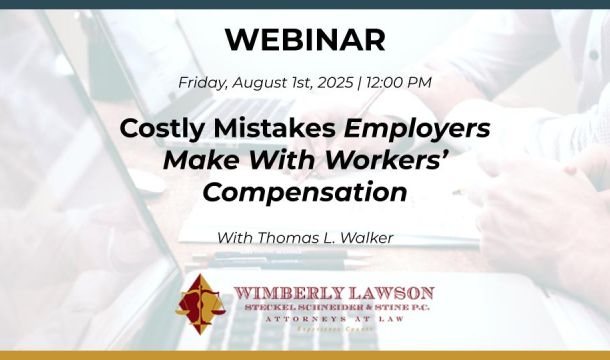DETERMINING STRATEGY ON WHEN AND HOW TO FIGHT AN UNEMPLOYMENT CLAIM
Perhaps the most common form of employment "litigation" is a claim for unemployment compensation. Such claims are so common that only a few employers even consider this as "litigation," although such cases often involve a hearing before a state administrative officer or "judge." Similarly, a record can be established, often by a recording that can later be transcribed. Such a transcript can be useful to an employer, or to a plaintiff, in any subsequent litigation of a more serious nature, such as a discrimination lawsuit.
Further, the mere fact that an unemployment claim is challenged by an employer may cause a former employee to seek the advice of an attorney. The claimant's attorney may suggest a stronger course of action for the employee than a simple unemployment claim, such as an EEOC charge or discrimination lawsuit. In either event, a simple unemployment claim suddenly becomes a more serious matter.
The authors have experienced numerous "horror stories" of having a personnel clerk show up at an unemployment hearing, only to be confronted not only by the claimant, but also by the claimant's attorney, who demands important documents and asks some particularly penetrating questions. The clerk or company representative may or may not be prepared to answer such questions, but in any event the result is that the plaintiff is able to establish a potentially favorable record for a subsequent more serious claim. The company is often not prepared for this possibility.
In spite of these considerations, most employers choose to "fight" an unemployment claim if the employee has been discharged. An employee who has been laid off or who resigns for a good reason can normally draw unemployment benefits, while an employee discharged for a good reason normally cannot draw unemployment benefits. The key is whether the discharge was for a good reason, which under the laws of most states requires willful misconduct. Consider the example of an employee discharged for low productivity. If an employee seeks unemployment compensation and testifies that he or she tried to do their best, they can normally draw unemployment benefits, because they have not committed willful misconduct. On the other hand, if an employee's low productivity is due to failure to follow company instructions, the failure to follow instructions can often constitute willful misconduct, resulting in a denial of unemployment benefits.
Grounds for an employer to defend an unemployment claim furnish "textbook" training for any type of disciplinary action. It is desirable for there to be a written set of company rules, and the employer should show that the employee violated those rules. It also helps if there were one or more prior written warnings prior to the discharge decision.
In order to facilitate the processing of unemployment claims, many states require an employer to provide a written notice of termination on a designated form for terminating an employee. Rarely is there a penalty for failure to provide such a form, however. Similarly, usually there is no penalty against an employer for failing to respond to an unemployment claim that has been filed, other than the fact that the claim is more likely to be granted if the employer does not oppose it.
Why do employers oppose unemployment claims of former employees? Some employers oppose such claims as a matter of principle, finding it totally inappropriate when an employee is discharged for willful misconduct who will then be able to benefit from his termination. A series of multiple recoveries of unemployment benefits on the part of former employees may cause the employers "experience rating" to go up, meaning an increase in the proportion of wages that has to be paid as unemployment taxes to the state.
Some employers agree to not oppose the former employee's unemployment claim as part of a negotiated severance or settlement. If the former employee has waived any rights against the former employer, some employers consider their agreement not to oppose an unemployment claim as a small price to pay for such a settlement.
Related Content
Get Email Updates
Recent Content

How to Audit Employment Discrimination Laws Compliance

TPS Update (As of 6/17/2025)

TPS Designation for Honduras and Nicaragua Automatically Extended, But the Date is Uncertain

President Trump Discourages Criminal Enforcement of Agency Rules

Supreme Court Suggests Trump Can Fire Agency Heads without Cause

